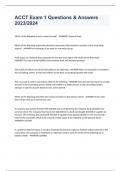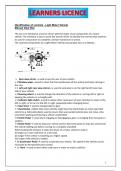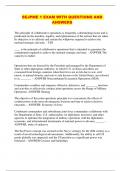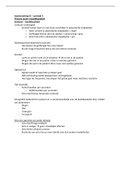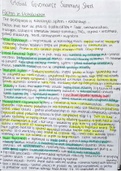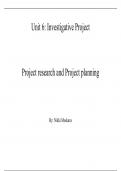SUMMARY OPERATIONS MANAGEMENT
CHAPTER 1 – OPERATIONS MANAGEMENT
OPERATIONS ARE EVERYWHERE
Everything is or made through an operation
- The best way to start understanding the nature of ‘’operations’’ is to look around you
- Everything you can see around you has been produced by an operation
- Every service you consumed today (radio station, bus service, lecture, etc) has also been produced by
an operation
- Everything you buy, sit on, wear, eat and throw away, was created by an operation
Operations management = the activity of managing the resources which are devoted to the production and
delivery of products and services
- Uses resources to appropriately create outputs that fulfill defined market requirements
- But operations can be very different
ITO MODEL
All operations are input-transformation-output processes
SPECTRUM OF PRODUCTS AND SERVICES
Characteristics of goods/products
- Tangible
- Production proceeds consumption, they can be stored
- Transformed resources materials
,Characteristics of services
- Intangible
- Production at the same time as consumption, cannot be stored
- Transformed resources the customers
Spectrum of products and services
- Facilitating products
o Products that are produced by an operation to support its services, e.g., reports prepared by
a consultancy firm, receipts prepared at a shop
- Facilitating services
o Services that are produced by an operation to support its products, e.g., technical advice
provided by an aluminum smelting firm
PROCESS HIERARCHY
Process = an arrangement of resources and activities that transform input into outputs that satisfy customer
needs. They are building blocks of all operations and they form an internal network withing an operation
Operation processes can be analyzed at three levels
1. The level of the supply network
2. The level of the operation
3. The level of the process
THE 4 V’S – TYPOLOGY OF OPERATIONS
All operations processes transform inputs, but they can differ
Creating a typology of operations, based on four dimensions
1. Volume
2. Variety
3. Variation in demand
4. Visibility
,Volume = the level or rate of output from a process
Low High Variety
Low repition High repeatability = the
Each staff member performs Specialization range
more of each task
of
Less systemization Systematization
High unit costs Low unit costs
Capital intensive
Café Buutvrij (local café) KFC
different products and services produced by a process
High Low
Flexible Well defined
Complex Routine
Match customer needs Standardized
High unit costs Low unit costs
Regular
Taxi services Train services
Variation in demand = the degree to which the rate or level of output from a process varies over time
High Low
Changing capacity Stable capacity
Anticipation Routine process
Flexibility Predictable
In touch with demand High utilization of resources
High unit costs Low unit costs
Ski hotel Hotel in the city center (business)
Visibility (customer contact) = the amount of value-added activity that takes place in the (virtual) presence of
the customers
High Low
Short waiting tolerance Time lag between production and consumption
Satisfaction governed by customer perception Standardization
Customer contact skills needed Low contact skills
Received variety is high High staff utilization
High unit costs Low unit costs
Centralization
Personal tailor Factory producing clothes
CHAPTER 2 – OPERATIONS PERFORMANCE
3 LEVELS OF OPERATIONS PERFORMANCE
1. Operational level – operations performance objectives
- Quality
- Speed
- Dependability
- Flexibility
- Cost
2. Strategic level – operation strategi impact
- Learning
, - Capital
- Revenue
- Costs
- Risk
3. Societal level – operation sustainability
- People
- Planet
- Profit
How is operations performance judged at societal level?
- Society
- Shareholders
- Customers
- Regulatory bodies
- Lobby groups
- Suppliers
- Government
CSR = Corporate Social Responsibility
Triple Bottom Line (TBL) performance
- Planet = the environmental account, measured by environmental impact of the operation
- Profit = the economic account, measured by profitability, return on assets, etc. of the operation
- People = the social account, measured by the impact of the operation on the quality of people’s lives
How operations can impact TBL performance planet
- Recyclability of materials, energy consumption, waste material generation
- Reducing transport-related energy
- Noise pollution, fume and emission pollution
- Obsolescence and wastage
- Environmental impact of process failures
- Recovery to minimize impact of failures
How operation can impact TBL performance people
- Customer safety form products and services
- Employment impact of an operation’s location
- Employment implications of outsourcing
- Repetitive or alienating work
- Staff safety and workplace stress
- Non-exploitation of developing country suppliers
How operations can impact TBL performance profit
- Cost of producing products and services
- Revenue from the effects of quality, speed, dependability and flexibility
- Effectiveness of investment in operations resources
- Risk and resilience of supply
- Building capabilities for the future
CHAPTER 1 – OPERATIONS MANAGEMENT
OPERATIONS ARE EVERYWHERE
Everything is or made through an operation
- The best way to start understanding the nature of ‘’operations’’ is to look around you
- Everything you can see around you has been produced by an operation
- Every service you consumed today (radio station, bus service, lecture, etc) has also been produced by
an operation
- Everything you buy, sit on, wear, eat and throw away, was created by an operation
Operations management = the activity of managing the resources which are devoted to the production and
delivery of products and services
- Uses resources to appropriately create outputs that fulfill defined market requirements
- But operations can be very different
ITO MODEL
All operations are input-transformation-output processes
SPECTRUM OF PRODUCTS AND SERVICES
Characteristics of goods/products
- Tangible
- Production proceeds consumption, they can be stored
- Transformed resources materials
,Characteristics of services
- Intangible
- Production at the same time as consumption, cannot be stored
- Transformed resources the customers
Spectrum of products and services
- Facilitating products
o Products that are produced by an operation to support its services, e.g., reports prepared by
a consultancy firm, receipts prepared at a shop
- Facilitating services
o Services that are produced by an operation to support its products, e.g., technical advice
provided by an aluminum smelting firm
PROCESS HIERARCHY
Process = an arrangement of resources and activities that transform input into outputs that satisfy customer
needs. They are building blocks of all operations and they form an internal network withing an operation
Operation processes can be analyzed at three levels
1. The level of the supply network
2. The level of the operation
3. The level of the process
THE 4 V’S – TYPOLOGY OF OPERATIONS
All operations processes transform inputs, but they can differ
Creating a typology of operations, based on four dimensions
1. Volume
2. Variety
3. Variation in demand
4. Visibility
,Volume = the level or rate of output from a process
Low High Variety
Low repition High repeatability = the
Each staff member performs Specialization range
more of each task
of
Less systemization Systematization
High unit costs Low unit costs
Capital intensive
Café Buutvrij (local café) KFC
different products and services produced by a process
High Low
Flexible Well defined
Complex Routine
Match customer needs Standardized
High unit costs Low unit costs
Regular
Taxi services Train services
Variation in demand = the degree to which the rate or level of output from a process varies over time
High Low
Changing capacity Stable capacity
Anticipation Routine process
Flexibility Predictable
In touch with demand High utilization of resources
High unit costs Low unit costs
Ski hotel Hotel in the city center (business)
Visibility (customer contact) = the amount of value-added activity that takes place in the (virtual) presence of
the customers
High Low
Short waiting tolerance Time lag between production and consumption
Satisfaction governed by customer perception Standardization
Customer contact skills needed Low contact skills
Received variety is high High staff utilization
High unit costs Low unit costs
Centralization
Personal tailor Factory producing clothes
CHAPTER 2 – OPERATIONS PERFORMANCE
3 LEVELS OF OPERATIONS PERFORMANCE
1. Operational level – operations performance objectives
- Quality
- Speed
- Dependability
- Flexibility
- Cost
2. Strategic level – operation strategi impact
- Learning
, - Capital
- Revenue
- Costs
- Risk
3. Societal level – operation sustainability
- People
- Planet
- Profit
How is operations performance judged at societal level?
- Society
- Shareholders
- Customers
- Regulatory bodies
- Lobby groups
- Suppliers
- Government
CSR = Corporate Social Responsibility
Triple Bottom Line (TBL) performance
- Planet = the environmental account, measured by environmental impact of the operation
- Profit = the economic account, measured by profitability, return on assets, etc. of the operation
- People = the social account, measured by the impact of the operation on the quality of people’s lives
How operations can impact TBL performance planet
- Recyclability of materials, energy consumption, waste material generation
- Reducing transport-related energy
- Noise pollution, fume and emission pollution
- Obsolescence and wastage
- Environmental impact of process failures
- Recovery to minimize impact of failures
How operation can impact TBL performance people
- Customer safety form products and services
- Employment impact of an operation’s location
- Employment implications of outsourcing
- Repetitive or alienating work
- Staff safety and workplace stress
- Non-exploitation of developing country suppliers
How operations can impact TBL performance profit
- Cost of producing products and services
- Revenue from the effects of quality, speed, dependability and flexibility
- Effectiveness of investment in operations resources
- Risk and resilience of supply
- Building capabilities for the future

